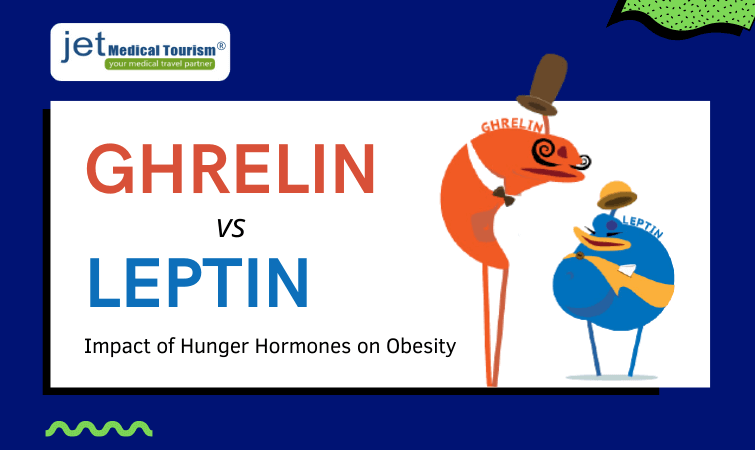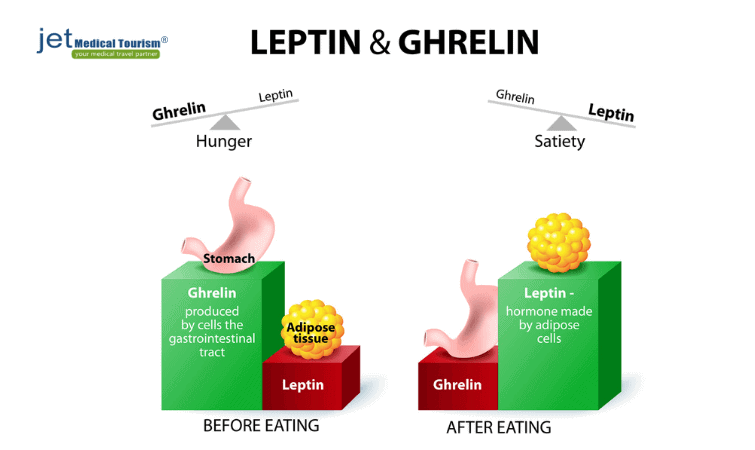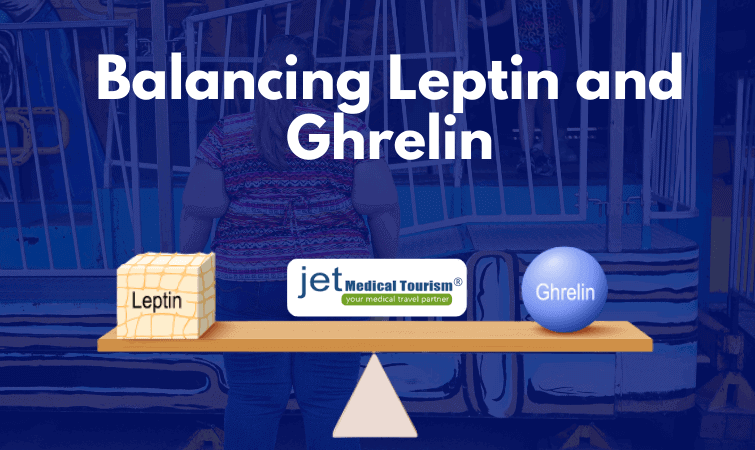If Ghrelin Levels Remain High Continuously an Individual Would Likely Experience

Obesity occurs from the dysregulation of hunger hormones in connection with metabolism. Centers for Disease Control and Prevention (CDC) data in 2019 found 20% or more adults and 18.5% of children (2 to 19-year olds) in the US were impacted by obesity. In 2020, over 66% of Americans are overweight/obese.
One of the greatest challenges for people trying to lose weight is dealing with their strong hunger sensations influencing their eating. Hunger hormones in the body are in a constant state of combat (ghrelin vs leptin). The most successful treatment options for bringing hunger hormone levels back to normal includes bariatric surgery, such as the gastric sleeve, gastric bypass, and the duodenal switch.
Contact Jet Medical Tourism ® today for more information.
What is ghrelin and leptin?
The ghrelin hunger hormone works to increase your appetite, while the hormone leptin works to decrease your appetite.
- Produced when the stomach empties, ghrelin works with the reward system pathway in the hypothalamus. When ghrelin levels are high, people feel the urge to eat more.
- Leptin is a product of the ob gene; lets our brain (central nervous system) know we have enough physical body fat and we're done eating.
RELATED: What is ghrelin?
How ghrelin and leptin work in your body
Both ghrelin and leptin work in the hypothalamus (brain) to control appetite impacting weight.
- Ghrelin causes people to feel hunger.
- The obese body only "thinks" its low ghrelin levels are higher; people crave more food.
Leptin lets people feel full.
- High leptin levels decrease hunger.
- But, leptin resistance causes a person to be unable to distinguish when they are full.
How can hunger hormones differ among populations?
Hunger hormone levels differ in males vs females, where ghrelin and leptin are higher in females. Ghrelin controls the release of growth hormone. A study found that women tend to be more sensitive to leptin compared to men since leptin is affected by reproduction and increased body fat. Ghrelin can be up to three folds higher in females than males.
Ghrelin vs leptin: key differences
In ghrelin vs leptin, leptin is fighting to make us stop eating long-term while ghrelin keeps trying short-term to make us eat more.
- Leptin is created from fat, regulates energy, and moves to the hypothalamus.
- Leptin communicates to the brain we ate enough.
- The brain stem receives signals from the digestive tract (stretch receptors of the upper stomach lining from ghrelin).
- As the amount of fat increases, leptin production increases.
- Healthy weight individuals with less fat produce less leptin, hence experience increased hunger sensations from ghrelin which targets meal initiation mainly from the stomach.
Role of leptin and ghrelin in obesity
Obese people have high leptin and low ghrelin.
- The brain is tricked into thinking ghrelin levels need to increase, increasing hunger.
- In obesity, ghrelin levels remain low and leptin is in a state of resistance, so the obese individual's brain can not tell when "enough is enough!".

| Hormone | Healthy hormone levels | Obesity hormone levels | Effect on healthy weight individuals | Effect on obese individuals |
| Ghrelin | High before meals; low after meals | Low | Person feels hunger only before meals | Person feels hunger regardless of a meal |
| Leptin | Low before meals; high after meals | High | Person feels full after meals | Resistance prevents feeling full |
Leptin, ghrelin, and weight loss
To achieve weight loss, leptin and ghrelin levels have to be brought back to normal levels where they are functional. Reducing body fat storage will reduce leptin levels. An overweight/obese person would need an intervention to bring ghrelin levels lower or to once again spike in times of hunger and drop quickly after meals.
Ghrelin and leptin cycle
The ghrelin and leptin cycle inside the obese body starts when people begin to eat food.
- Body fat increases, ghrelin decreases.
- Leptin levels increase in fat cells.
- In obesity, an abundance of fat disrupts leptin signals!
Insulin (in pancreas) releases once blood glucose increases after eating. Leptin from adipose tissue depends on insulin. Increased leptin causes more energy output. Ghrelin decreases insulin.
Can hunger hormones play a role in other medical conditions?
Yes, unbalanced hunger hormones can lead to weight gain, obesity, and cause complex diseases. According to Harvard University, diseases from obesity include:
- hypertension
- heart disease
- diabetes
- arthritis
- depression
- kidney stones
- fatty liver disease
- erectile dysfunction
- cancer
How to balance leptin and ghrelin

Leptin and ghrelin can become rebalanced by weight loss, especially with surgery. Food intake and energy output are required to be balanced via the central nervous system, regulating our feeding behavior/metabolism.
The benefit of targeting hunger hormones for weight loss
Weight loss interventions that work by targeting hunger hormones such as ghrelin and leptin help an overweight/obese individual achieve long-term weight loss. Diet and exercise have failed us.
- Studies have found exercise has no effect on changes in food intake, appetite, or hormones long-term (year+) due to a high rate of weight relapse.
- Other studies have reported people can have increased hunger sensations (higher ghrelin levels) up to a day after exercise.
Ghrelin vs leptin: How bariatric surgery impacts hunger hormone levels?
A faster effective method for weight loss like surgery cuts out the majority of the stomach, improving long-term ghrelin and leptin levels.
- Gastric bypass cuts the stomach into a small pouch (like gastric sleeve surgery), but also connects this pouch to the small intestines.
- Duodenal switch combines a gastric sleeve with intestinal re-routing.
- These metabolic procedures reduce ghrelin (fixing leptin).
RELATED: Compare gastric sleeve vs gastric bypass
A study reported on the effects of long-term weight loss after gastric sleeve and gastric bypass surgery.
- 1-year follow-up: Patients reported higher weight loss (30%) with gastric bypass compared to gastric sleeve (27%).
- 5-year follow-up: gastric bypass has 6.7% more total weight loss than gastric sleeve.
- 7-year follow-up: gastric bypass has a 30.4% mean weight loss compared to 23.6% in gastric sleeve patients.
RELATED:Gastric bypass surgery and hunger hormones
Final words on ghrelin and leptin hunger hormones
Regulating ghrelin and leptin is key to weight loss. From the lack of success with yo-yo dieting to the public's opinion of "why can't you just stop eating?", obesity is poorly understood. Our bodies can be programmed to overeat once hormone levels become imbalanced, causing uncontrolled obesity.
Diets or exercise do not serve as hormone solutions, therefore only work short-term.
Obese individuals seeking to stop those midnight cravings, be able to go out and play ball with their kids, or simply fit into "that dress" again often want a better option, a better lifestyle, a better future. That solution can be long-term if given the right resources.
It starts with targeting appetite, fixing your hunger, fixing your body's hunger hormones. When you need more than just temporary success, contact Jet Medical Tourism ® today to find out how you can make a long-term difference in your health and lifestyle!
References :
- Centers for Disease Control and Prevention. 2020. Adult Obesity Prevalence Maps. Accessed: 2, Nov. 2020. Web. https://www.cdc.gov/obesity/data/prevalence-maps.html.
- Harvard University. 2012. Web. Accessed: 2. Nov, 2020. Obesity in America: What's driving the epidemic? https://www.health.harvard.edu/staying-healthy/obesity-in-america-whats-driving-the-epidemic
- Barkan AL, Dimaraki EV, Jessup SK, et al. Ghrelin secretion in humans is sexually dimorphic, suppressed by somatostatin, and not affected by the ambient growth hormone levels. J Clin Endocrinol Metab. 2003 May;88(5):2180-4. doi: 10.1210/jc.2002-021169. https://pubmed.ncbi.nlm.nih.gov/12727973/
- Shi, H., & Clegg, D. J. (2009). Sex differences in the regulation of body weight. Physiology & behavior, 97(2), 199–204. https://doi.org/10.1016/j.physbeh.2009.02.017. https://www.ncbi.nlm.nih.gov/pmc/articles/PMC4507503/
- Sumithran, P., Prendergast LA, et al. Long-Term Persistence of Hormonal Adaptations to Weight Loss. The New England Journal of Medicine. 2011;365(17):1597-604. DOI: 10.1056/NEJMoa1105816.https://www.nejm.org/doi/full/10.1056/NEJMoa1105816
- Heden TD, Liu Y, Park Y, et al. Acute aerobic exercise differentially alters acylated ghrelin and perceived fullness in normal-weight and obese individuals. J Appl Physiol (1985). 2013 Sep 1;115(5):680-7. doi: 10.1152/japplphysiol.00515.2013.https://pubmed.ncbi.nlm.nih.gov/23845979/
- Mayo Clinic. Gastric Bypass (Roux-en-Y). 2020. Web. accessed: 3, Nov. 2020. https://www.mayoclinic.org/tests-procedures/gastric-bypass-surgery/about/pac-20385189
- Mayo Clinic. Biliopancreatic diversion with duodenal switch. 2020. Web. accessed: 3, Nov. 2020. https://www.mayoclinic.org/tests-procedures/biliopancreatic-diversion-with-duodenal-switch/about/pac-20385180
- Mayo Clinic. Sleeve gastrectomy. 2020. Web. accessed: 3, Nov. 2020. https://www.mayoclinic.org/tests-procedures/sleeve-gastrectomy/about/pac-20385183
- Flack KD, Hays HM, Moreland J. (2020). The consequences of exercise-induced weight loss on food reinforcement. A randomized controlled trial. PLoS ONE 15(6): e0234692. https://doi.org/10.1371/journal.pone.0234692. https://journals.plos.org/plosone/article?id=10.1371/journal.pone.0234692
- Arakawa R, Febres G, Cheng B, et al. (2020) Prospective study of gut hormone and metabolic changes after laparoscopic sleeve gastrectomy and Roux-en-Y gastric bypass. PLoS ONE 15(7): e0236133. https://doi.org/10.1371/journal.pone.0236133. https://journals.plos.org/plosone/article?id=10.1371/journal.pone.0236133
sandersonbearbing.blogspot.com
Source: https://jetmedicaltourism.com/ghrelin-vs-leptin/
0 Response to "If Ghrelin Levels Remain High Continuously an Individual Would Likely Experience"
Post a Comment